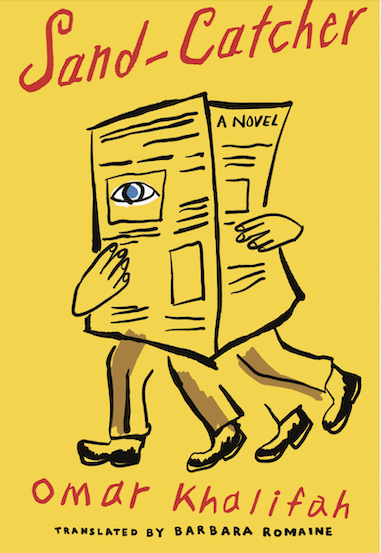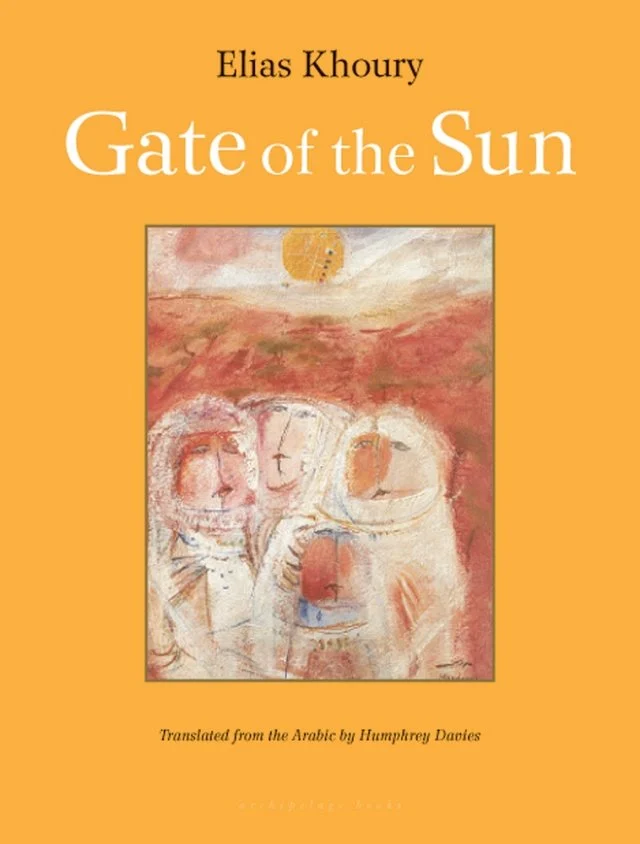Sand Catcher and Gate of the Sun
Authors: Omar Khalifah & Elias Khoury
In these unreasonable times, one would do well to remember what George Santayana said in his book, The Life of Reason: “Those who cannot remember the past are condemned to repeat it.” Thus, I have been reading up on the sad, conflicted history of the nakba— in Arabic, “catastrophe’ and here, specifically, the the mass expulsion of the Palestinians (roughly 700,000), the killings and damages wrought against them during the 1948 founding of the state of Israel. Now, mind, in the ’90s, I had helped my Jewish aunt translate her cousin’s journal: he had moved to that part of the world before 1948, referring to himself as a secular Zionist, and voiced the slightly bewildered, if naive, why weren’t progressive Jews all Zionists? His journal was written in French, which my aunt translated into English, and which I helped smooth out so the journal could be shared with family. Notably he had refused to write in German out of anger at the Nazis’ genocidal horrors. He fully expected to live side by side with the Palestinians; and what also struck me even these many years later was that the text was dotted with remarks like, “for ‘olive‘ in Arabic, they say ‘zaytun‘,” and so on. Towards the end, on a rueful note, he commented on the negative change in—what? the idea/formation of nation, of nationalism, of the monocultural state?—as these entered that world with more right wing and conservative, religious Jews.
No one wants to deny a people a safe shelter, especially those having suffered the grotesque horrors of the Nazi extermination camps, ethnic cleansing, and more. But now, in the sad history of this part of the world, and with the rightwards lurch of Israel’s leading government (along with far to many others), we are again facing justifications for brutality. It is blatantly obvious that our own inept and narcissistic rulers are quite ignorant of a) the history of this part of the world; nor, to be blunt, b) do they care, and the nakba remains a blight that said governments have taken no part in genuinely resolving.
Which brings me to two books: The Sand Catcher by Omar Khalifa, published by Coffee House Press, and one which I had been reading before that one which is several times referred to in Sand Catcher, Elias Khoury’s Gate of the Sun. The Sand Catcher, even though it is a work of fiction, deals head-on with the belief in the necessity of remembering history and begins in Jordan with a group of journalists of Palestinian background trying to interview a grandfather identified as one of the last survivors of the nakba. Wanting to get this grandfather to consent to an interview and struggling to convince his family to allow access, the journalists win first entrance when the man’s son says, “oh, like Gate of the Sun, you mean?” (He, too, would like to hear what his father has never shared—those memories.) However, protecting the grandfather’s right to remain silent, a grandson is furious and abusive towards the journalists. The son remains anxious and hovering, but in ensuing encounters, becomes more protective of the grandfather’s silence. At that first encounter, however, the old man emphatically does not share his memories, and tells the interviewers to eff off, in flat-out obscene language.
The blurb on the back of the book headlines with “a sardonic, thrilling fable about collective memory…” Is that phrase, collective memory, in essence, another way of describing history? both the creation of a sense of us, of the collective we, through both fact and, let’s face it, fiction. I would suggest that one must know, as accurately as possible, what really happened and that losing or burying that knowledge indeed represents the loss of a sense of the collective, that all important we. As Khalifa’s work attempts, only then can one create a fiction that does not betray it.
The fablesque aspect of Sand Catcher sometimes seems to give the author a reason to stint a bit on character development; for in the writing, there is the occasional lurch towards flatness. That being said, however, I believe it a good read. I further suggest that Sand Catcher be read in tandem with Khoury’s Gate of the Sun. I myself read The Sand-Catcher first, then returned to Khoury’s book which I had barely begun. The Sand-Catcher, as noted, focuses on the attempts of the above-mentioned journalists to pry loose information from a survivor of the Nakba of 1948: a grandfather who at the time of the Nakba was only 15. He has refused to share his memories of that traumatic time with anyone—certainly not the journalists, nor family; and thus a large chunk of the book is devoted to the various strategems the journalists use to try to get those memories out of him. In fiction, The Gate of the Sun actually does what the grandfather character refuses to do and, reading the books in the order I suggest somehow makes those events seem even more stark, more wrenching. For better or worse—the nakba, to put it mildly, was not a happy experience—that suggested strategy gives the reader a fuller sense of it.
Gate of the Sun, gives us memories of the Nakba, though not the above grandfather’s. As Sand-Catcher is a call; Gate of the Sun is a response. The latter also ruffles up the simplicity of the idea of history:
“a story is a life that didn’t happen, and a life is a story that didn’t get told.”
And here, too, we have a conundrum, as Gate of the Sun’s narrator muses, recalling the words of a man—a friend, sometime mentor—now in a coma,
” ‘…[we] think that the living inherit the lives of all others. That’s why history was invented. …I know that history is a trick to make people believe that we’ve been alive since the beginning and that we’re the heirs of the dead. An illusion. People aren’t heirs, and they don’t have a history or anything of the sort. Life is a passage between two deaths….’
[The narrator questions this person] ” ‘But history isn’t an illusion,’ I answered. ‘And if it were, what would it be for?’
“What would it be for?
“Why would we fight and die? Doesn’t Palestine deserve our deaths? You’re the one who taught me history, and now you tell me history is a ruse to evade death!
What I am suggesting is that, yes, in reading the two books together, one can find a brief answer to the obstinacy of the Sand-Catcher‘s grandfather character, a “filling in”, as it were of the old man’s memories or ones that so many of his compatriots experienced. However, at the same time, we are privileged to get at least a glimpse of the elusive “we” which so few wish to acknowledge, the lost “we” which much historical fiction seeks, as well as the dilemma of how to present it.
— Bronwyn Mills


